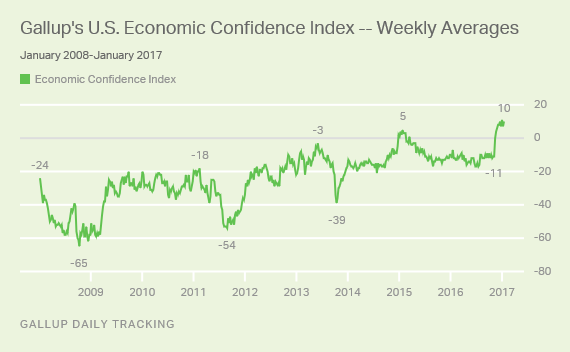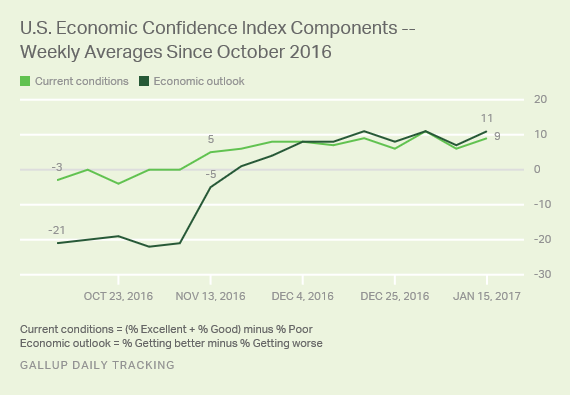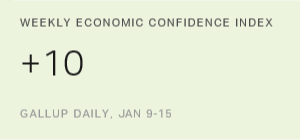Story Highlights
- Economic confidence has been at or near record-high levels since election
- Confidence stands at +16 among Republicans, +8 among Democrats
- Economic outlook component score (+11) ties for nine-year high
WASHINGTON, D.C. -- Americans' economic confidence remained in positive territory last week, with Gallup's U.S. Economic Confidence Index registering +10 for the week ending Jan. 15. This was up from +7 the prior week and is just one point below the nine-year high the index hit in the last week of December 2016.

After nine years of nearly uninterrupted negative economic assessments, Americans' views of the economy brightened significantly after the November presidential election. This positive swing mostly stems from surging confidence among Republicans and independents who lean Republican, whose index score stood at +16 last week. This score represents a sharp reversal from their highly negative scores before the election, including -43 in early November.
By contrast, confidence in the economy has fallen among Democrats, with Democrats and Democratic leaners' score falling from +27 before the election to last week's +8. Nonetheless, even if Democrats' confidence in the economy has slumped since the election, it is still considerably higher than the negative levels that prevailed among Republicans for much of President Barack Obama's tenure.
However, once Donald Trump officially takes over the presidency on Friday, it would not be surprising to see Democrats' economic confidence sapped further. If there is not a commensurate rise in confidence among Republicans, the overall index score will likely fall as well.
Gallup's U.S. Economic Confidence Index is the average of two components: how Americans rate current economic conditions and whether they feel the economy is improving or getting worse. The index has a theoretical maximum of +100 if all Americans were to say the economy is doing well and improving, and a theoretical minimum of -100 if all Americans were to say the economy is doing poorly and getting worse.
Both the current conditions and economic outlook components of the index rose modestly last week compared with the previous week, with both components remaining at or near their highs since 2008.
The current conditions component measured +9 last week, based on 31% of Americans rating the present economic conditions as "excellent" or "good," and 22% describing them as "poor." The current conditions score stood at +6 one week earlier.
The economic outlook component, meanwhile, reached +11 last week for the third time since the election -- the highest score since Gallup began tracking this measure daily in 2008. Fifty-two percent of Americans said the economy was getting better, while 41% said it was getting worse. The economic outlook score stood at +7 for the week ending Jan. 8.

Based on their economic outlook scores, Republicans (+32) are far more optimistic than Democrats (-3) about the direction of the economy. Democrats continue to be more positive than Republicans about the economy's current conditions (+19 vs. -1, respectively), but that is likely to change once Trump assumes control of the presidency.
Bottom Line
For many Americans, particularly Republicans, the 2016 presidential election inspired confidence in the economy. Though this may mostly reflect the political lens through which many Americans assess the economy, other economic indicators have also rallied since Trump's election -- including the stock market and optimism among U.S. investors as measured by the Wells Fargo/Gallup Investor and Retirement Optimism Index.
Additionally, "hard" economic measures such as gross domestic product continue to suggest an uptick in economic activity, though this cannot be characterized as a response to the election.
All the same, economic confidence could change once Trump takes the reins of power. Most likely, economic confidence among Democrats will drop as they begin to evaluate an economy led by Trump rather than by outgoing President Obama. Future confidence may rise or fall depending on what effect Trump's still-unclear economic policies have on the economy.
These data are available in Gallup Analytics.
Survey Methods
Results for this Gallup poll are based on telephone interviews conducted Jan. 9-15, 2017, on the Gallup U.S. Daily survey, with a random sample of 3,568 adults, aged 18 and older, living in all 50 U.S. states and the District of Columbia. For results based on the total sample of national adults, the margin of sampling error is ±2 percentage points at the 95% confidence level. All reported margins of sampling error include computed design effects for weighting.
Each sample of national adults includes a minimum quota of 70% cellphone respondents and 30% landline respondents, with additional minimum quotas by time zone within region. Landline and cellular telephone numbers are selected using random-digit-dial methods.
Learn more about how the Gallup U.S. Daily works.



